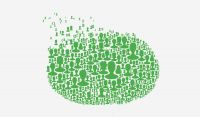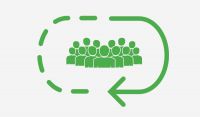Sociopolitical Systems
Political systems emerge out of their underlying social system in a very organic fashion. Thus properly interpreting many political phenomena require tracing them back to their sociocultural roots.
The term sociopolitical system refers to systems composed of both social elements and political elements and the interaction between them.1 In asking the question where does governance come from or on what do we base governance on? The answer is sociocultural institutions. Political systems sit on top of and are dependent upon their underlying social system – in that political institutions emerge from and are determinant of the actions and relations between agents.2 The idea of sociopolitical systems is explicitly designed to focus one’s attention on the interaction between the social system and political system and processes that involve elements of both. Sociopolitical analysis helps us to identify and trace processes that span both the social system and the political system. Such processes can not be fully interpreted by simply focusing on their manifestation within the political realm, in that they have their origins within more fundamental social processes – from which they can not be fully separated. In such cases, it is of value to look at the whole of the social and the political realm as a single organization so as to identify and trace these interactions and processes. One such example would be political movements.3 These processes of change often originate in informal social groups that over time galvanize into political movements. In understanding such issues as racism, inequality or populism it is required to look not just at the political system itself, but also at cultural factors and social factors within the broader community. Sufficed to say, studying politics and power as closed systems yields only limited results, to understand more fundamental and complex phenomena it is important to recognize political systems as open systems embedded within a broader social system.
Social Systems
Social systems are a type of system composed of individual people and the relations between them through which they are interdependent within the whole organization. Unlike a simple set of people or a group of people, where the members may be independent, the essence of social systems is the interdependence between members.4 This interdependence means what one does affects another and the whole organization. Social systems are composed of agents, the interdependent relations between them and the organizational structures that emerge out of their interaction, what we can call institutions that exist on various levels.
A social agent is an abstract representation of an individual or organization that has some degree of autonomy in their capacity to make choices and to act independently on those choices. In order to make choices agents must have some representation of their environment and some set of rules under which to make those choices, we can call this a schema, conceptual system, a culture or worldview. A schema gives the agent the means for classifying and interpreting information from their environment, they have some logic under which to make decisions and they have some form of value system that defines what are better or worse states, they then make decisions and take actions to effect their state and that of their environment towards their desired ends.
Thus an agent is not just a decision maker it is also an actor. To be an agent the individual or organization must have means for effecting its environment in some way. A stone is not an agent but a monkey is because it has the use of its body to move things in its environment. All pre-social must have influence over their environment in someway. They are able to sense information, make decisions based upon their set of rules and take action to achieve their desired state. This combination of elements that gives an entity agency may be called a cybernetic system or a regulatory system, in that agents use these elements of communication and action self-interested regulate themselves and their environment according to their value system.5 Social systems exist whenever there is more than one social actor and their actions are interdependent in someway. In the course of pursuing their interests and activities agents inevitably interact and in that interaction, they become in someway interdependent, what happens to one affects what happens to another and vice versa. These relations of interdependence can be defined as positive or negative depending on how the goal attainment of the individuals relate to each other.6
When the goal achievement or benefit of one agent is negatively correlated with another this is called negative interdependence. Negative interdependence is when one agent can only achieve their desired end by another failing to, i.e. there is a negative correlation between their states. Positive interdependence is when there is a positive correlation of some kind between the welfare of each agent in the relation; meaning what happens to one also happens to another, all win or lose together.6 These types of interdependence are very fundamental to the dynamics of social systems and describe much of how agents relate to each other. They can be seen to strongly affect the dynamics of cooperation and competition and the resulting overall social system that emerges.
Institutions
Institutions are sometimes called “social technologies” such a definition derives from the fact that they can be seen as rationalized systems for automating social interaction and social functions similar to the way that a physical technology rationalizes and automates physical processes.
Recurring patterns of interaction between members form what are called social institutions. A social institution is a specific pattern of relations between members of a society.7 In their organized and persistent set of relations, they provide order to a social system but also serve important social functions. Thus institutions are structures or mechanisms of social order and cooperation governing the behavior of a set of individuals within a given community. They can also be understood as a persistent constellation of status, roles, values, and norms that respond in some way to societal needs. Institutions – like schools, religions, armies, sports clubs, charities, businesses, governments – are made of individual members but in order for them to operate successfully, they have to organize and coordinate their members within overall processes through which they perform functions.8 Thus they require the individual to conform to the specified roles, norms and procedures that enable the institution to function effectively. This set of rules that members are required to follow may be formal or informal; depending on the type of organization and how important it is to its overall workings.
In order to have institutions – which are a type of social agent – individual actors have to give over their agency to the organization, that means giving over their own decisions and actions to the organization for it to act as an integrated whole. Institutions are the aggregation of the agency given over by their members. In their combined and synchronized activity, the organization as a whole can perform functions and processes that none of its parts can – in such a way we get the emergence of new features, processes, and functions on different levels within the social system. Individual social actors create the institutional structures but then these institutional structures feedback to constrain the members towards the aims and motives of the whole organization. For example, in order to enable the process of learning within a classroom students must be relatively quiet and attentive during a class. In such a way when the students enter the class they give over some of their agency. They bind themselves into an agreement that is required for the collective process of the educational institution to take place effectively and the institution will regulate the members through various forms to ensure they conform to its ends. Thus emerges a complex dynamic between the macro-level institutional structures, rules and norms and the individual’s agency, motives and interests – which can be seen to encompass much of what we study in political and social science.9
Political Systems
Political systems are a type of social institution, like all social institutions they are a kind of social agent; they are an organization that makes decisions and takes actions based upon those decisions. More specifically political systems are a type of social institution that makes decisions and acts for the public; where public means, relating to or affecting a population or a community as a whole. Thus politics emerges naturally out of the very defining characteristic of social groups, that is to say, their interdependency. Wherever we have interdependence between members what one does affects the other and collective decision making and action is required to regulate the combined organization. We can then see how this idea of interdependence feeds through to the definition of politics; where politics is the process of collective decision-making and implementation. The key word being collective, which is captured in the term public. Politics is the process of collective decision-making and implementation.
Although we formalize political processes into abstract rules and institutions, in its essence politics is a very organic part of social systems. To have a political system, we must have more than one person and they have to be interdependent or autonomous in some way. That is to say, there must be the potential for their ideas and actions to diverge in some way. In such a case we have a question about how the combined organization will operate, whose opinion will be included in making decisions? How will the process of reaching a combined conclusion be conducted? How will it be implemented and enforced? Answers to these questions will describe the political process of collective decision making and implementation. Politics and political systems are social institutions that perform a process of management, they manage the public realm, what is also called governance. The word governance derives, ultimately, from the Greek verb κυβερνάω [kubernáo] meaning to steer, like a person steering a boat. Public governance is enacted through a regulatory system composed of a number of different institutions, such as lawmakers, public administration, law enforcement, etc.
Types of Political Systems
The modern era has seen the rise of rational political institutions based upon reason encoded in law and executed through a bureaucratic state management apparatus
A primary question in the analysis of political systems is to ask on what is the authority or legitimacy of the political system based? On what basis does a person come to have influence over the collective decision-making process? On what should we base whether someone has a greater or lesser influence? The simplest answer to this is force. That whoever has the strongest will or can exert the greatest force will be able to overpower the others and thus exert their will over the combined organization. This dynamic was most clearly describe by the philosopher G. W. F Hegel in his book The Phenomenology of Spirit where he noted that when two conscious beings, who believe themselves to be absolutely free and unrestrained, encounter each other there is a struggle for recognition, leading to the “master-slave dialectic”, where one member ultimately has to submit to the other and become the lesser party (constrained) in the combined agency that is guided by the master who has a greater say in the organization.10
A political system based upon the use of force to determine political decisions and actions leads to an authoritarian political system. The continuous struggle over power through force is a highly costly activity – as illustrated by the fact that most animals do not directly fight but use various displays of power as a proxy. Thus in most political systems, the use of force is not explicit or manifest, it is mediated and diffused in many different forms; propaganda, intimidation, displays of power, manipulation of various kind etc. In a regime based on force, power is a central component of the political system, in that power is the capacity to get others to do things against their will.11 To effectively exercise power authoritarian systems favor or enforce strict obedience to authority at the expense of personal freedom. Authoritarian systems emphasize structure over function within the institution; the primary aim is to maintain power and the mechanisms of control. Most political systems throughout civilized history have been authoritarian in nature. Originally, the state was a military institution. For many centuries, it was just a territory ruled by a leader such as a king who was surrounded by a small elite group of warriors and court officials; essentially a rule by force over a larger mass of people. Slowly, however, the people gained political representation for none can really be said to be a member of the State without the right of having a voice in the direction of policy making.12
Rational Institutions
Whereas authoritarian political institutions define the interest of one or a limited number of actors influencing the overall decision-making process and ensuring this position through forceful structures of obedience, political institutions may also be managed according to their functionality within the broader society; their results for the whole society can be a basis for their organization. That is to say instead of force being the basis for participation in decision making, an objective set of rules that apply to all and are design to achieve optimal outcomes for all can provide a legitimate basis for governance. Such rules are derived from the application of reason within a process of decision making based on the discourse between different opinions where the outcome is measured according to its value to the whole of society.
Such political systems instead of being based upon the subjective interest of a few are based on objective reasons given, that are designed to be in the interests of all. Reason is the capacity to form ideas and opinions based upon a coherent and consistent objective set of logical rules which accord with empirical data. It is a rule that one must follow to have an objective reason for one’s actions. Entities that act according to reason or are designed according to reason are called rational. Rational means to subsume particulars under general rules based on reason.13 In the case of political institutions, this means to subsume the specific particularities of any group under general rules defined by all, or rules designed to be in the interest of all. In order to do this, it must be that all are equal before the political institutions which then determine eventualities based upon a set of rules derived from reasoned based discourse.
The categorical imperative is an example of a rational moral system. Simply stated it is the rule that one should only do what one would wish to become a universal rule. It is subjecting one’s actions to following an objective rule that is in the interests of everyone instead of the interests of any specific subjective group or individual, thus it is a rational moral code. Taken in the broader context of human civilized history this rise of reason in the modern era is truly radical, in that it has required us to discard other sources of social ranking. To make all equal before reason. For most people that lived before the modern era the idea that people are equal and that reasons should determine things would make little sense to them. For us modern people it seems apparent that order comes from reason whether this is the order to our universe that we have derived through scientific inquiry or the rational foundations our institutions. For premodern societies, the order to the world is something that is given and reason has little role to play, the order is fixed and given by the social and cultural elite.14 Modernity has seen a switch from political organizations based on one’s status within a community to contract based relations. The new sociologists of the late 19th and early 20th centuries recognized that contemporary society was novel. Traditional society related individuals through statuses or roles in local and parts were highly similar in function. Modern society increasingly related individuals through explicit legislation governing individual contracts, hence, voluntary associations, in which society is characterized by a high degree of division of labor.15
Social Contract
Modern governments are seen to be the product of a social contract between the people as they give over their freedom to a sovereign in exchange for protection, while the sovereign remains bound by laws.
The modern era has witnessed a massive rise of rational institutions as they have become the dominant institutional technology of modern societies around the world. Richard Price the English philosopher and author in talking about the ongoing French Revolution of his time summed this up when he said, “the French are rightly replacing kings with laws and priests with reason and conscious.” From Plato through to the medievals the idea that a just society could be constructed without virtuous rulers was incomprehensible – for the ancients, the ethics of individuals could not be separated from the conduct of politics.16 From this perspective, political systems had to be ruled by the virtuous and wise to be successful. The modern era took a radical departure from this, recognizing that political society will often have to continue without moral virtue and still find a way to be just and stable without it. That stable outcome and order could emerge from the interaction of purely self-interested individuals. Political theory in the modern era became increasingly based around the idea of the rational self-interested individual and how to develop systems for managing politics based upon reason with an aim to provide the maximum benefit to all. Governance in the modern era came to be understood in terms of social contracts to serve rational self-interested individuals.16
The rise of rational institutions is most clearly seen in the formation of the social contract theory of the state, which rejects the idea that religion or tradition should determine politics. Social contract theory starts with the idea of humans in a state of nature where all are equal – which is an explicit rejection of many traditional social systems engendering innate inequalities, such as the aristocratic system or the caste system.17 Thinkers like Thomas Hobbes, John Locke and others formulated a basis for public authority as a social contract among rational self-interested individuals for the sake of personal security and advancement. Modern political philosophy searched for the foundation to political organization and legitimacy in the individual’s rights and self-interested reasoning. The test of a political system came to be formulated as whether rational self-interested people would choose it.17 Power and authority belonged to law and offices, not to people and only as long as they perform their functions while tradition and religion were seen to have no place in determining political organization – which are very radical ideas given the existing status quo for most of human civilization.
Social contract theories then go on to construct a foundation for government based on the assumption that people are rational beings. The idea of social contract theory is that a political system is just if it would be chosen by rational self-interested individuals in a pre-social state of equality; the so-called “state of nature”. Because the state of nature is seen to be a war of all against all – as Thomas Hobbes posited – out of entirely rational self-interest each individual will come to the conclusion that if they can leave this condition they should due for purely self-interested reasons.18 Everyone will lay down their weapons and cooperate, each allowing others an equal amount of freedom, as long as this works the individual will stay true to the agreement and that is the social contract. But in order to solidify this construct, it is necessary to have some overall third party organization to enforce it and make all obey or else it is of little value. Thus power must be transferred to the sovereign to allow it to enforce this contract.18
Thus free pre-social individuals out of their rational self-interest come to give up some of their freedom to a political body for the sake of security. The government then only has those powers and rights that the members have given up in the contract. This is individualistic in that it posits rights on the individual instead of the whole, the individuals give their rights to the whole. Most justifications for modern political communities is that order comes from the structures that self-interested citizens freely impose on themselves and is constructed out of deliberative reasoning and discourse by the people; what we call democracy.18 Within this political paradigm, the government is seen to be a fiduciary power to act for certain ends of the community. A fiduciary is a trustee, one who holds money in trust for another. Governments are rational instruments for the public good and this limits government power. Governments only have the powers given up to them in the social contract and must use them for the common good. Governments must always obey their constitutions and governments have many legal and technical limitations on their actions.18
1. Sociopolitical definition and meaning | Collins English Dictionary. (2017). Collinsdictionary.com. Retrieved 12 June 2017, from https://www.collinsdictionary.com/dictionary/english/sociopolitical
2. Sociocultural Systems. (2017). Google Books. Retrieved 12 June 2017, from https://books.google.ie/books/about/Sociocultural_Systems.html?id=pQNB7d6RQGcC&printsec=frontcover&source=kp_read_button&redir_esc=y#v=onepage&q&f=false
3. (2017). Hse.ru. Retrieved 12 June 2017, from https://www.hse.ru/data/2012/11/03/1249193172/Donatella_Della_Porta_Mario_Diani_Social_Mov.pdf
4. (2017). Home.ku.edu.tr. Retrieved 12 June 2017, from http://home.ku.edu.tr/~mbaker/CSHS503/TalcottParsonsSocialSystem.pdf
5. (2017). Onlinelibrary.wiley.com. Retrieved 12 June 2017, from http://onlinelibrary.wiley.com/store/10.1002/9781119206613.app2/asset/app2.pdf?v=1&t=j3ufa27b&s=4d445be58ac3a52d6d5bb8f9df41c9ba0ff5e678
6. RT, J. (2017). New developments in social interdependence theory. – PubMed – NCBI . Ncbi.nlm.nih.gov. Retrieved 12 June 2017, from https://www.ncbi.nlm.nih.gov/pubmed/17191373
7. (2017). Sociologiajuridica.files.wordpress.com. Retrieved 12 June 2017, from https://sociologiajuridica.files.wordpress.com/2011/10/lane-ersson-new-institutional-politics.pdf
8. The Theory of Institutional Design. (2017). Google Books. Retrieved 12 June 2017, from https://goo.gl/S2fEHX
9. Bridging the Micro–Macro Divide: A New Basis for Social ScienceHuman Relations – Chris Goldspink, Robert Kay, 2004. (2017). Human Relations. Retrieved from http://journals.sagepub.com/doi/abs/10.1177/0018726704044311
10. Spirit, Hegel, G., Miller, A., & Findlay, J. (2017). Phenomenology of Spirit. Goodreads. Retrieved 12 June 2017, from http://www.goodreads.com/book/show/9454.Phenomenology_of_Spirit
11. Dictionary, p. (2017). power Meaning in the Cambridge English Dictionary. Dictionary.cambridge.org. Retrieved 12 June 2017, from http://dictionary.cambridge.org/dictionary/english/power
12. Social Sciences. (2017). Google Books. Retrieved 12 June 2017, from https://goo.gl/3b5Jx1
13. Hanna, R. (2004). Kant’s Theory of Judgment. Plato.stanford.edu. Retrieved 12 June 2017, from https://plato.stanford.edu/entries/kant-judgment/
14. The Modern Political Tradition: Hobbes to Habermas. (2017). English. Retrieved 12 June 2017, from http://www.thegreatcourses.com/courses/the-modern-political-tradition-hobbes-to-habermas.html
15. The Division of Labor in Society (1893). (2017). Durkheim.uchicago.edu. Retrieved 12 June 2017, from http://durkheim.uchicago.edu/Summaries/dl.html
16. The Modern Political Tradition: Hobbes to Habermas. (2017). English. Retrieved 12 June 2017, from http://www.thegreatcourses.com/courses/the-modern-political-tradition-hobbes-to-habermas.html
17. Social Contract Theory | Internet Encyclopedia of Philosophy. (2017). Iep.utm.edu. Retrieved 12 June 2017, from http://www.iep.utm.edu/soc-cont/
18. (2017). Sophia-project.org. Retrieved 12 June 2017, from http://www.sophia-project.org/uploads/1/3/9/5/13955288/elahi_socialcontract.pdf







